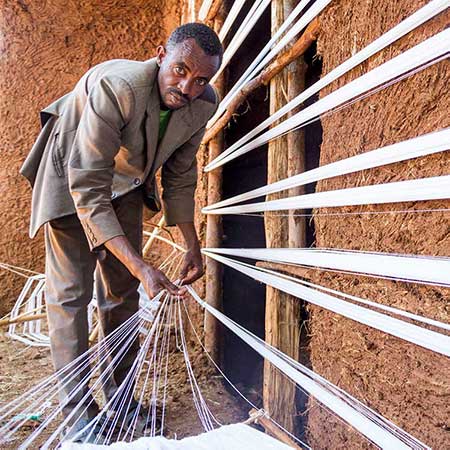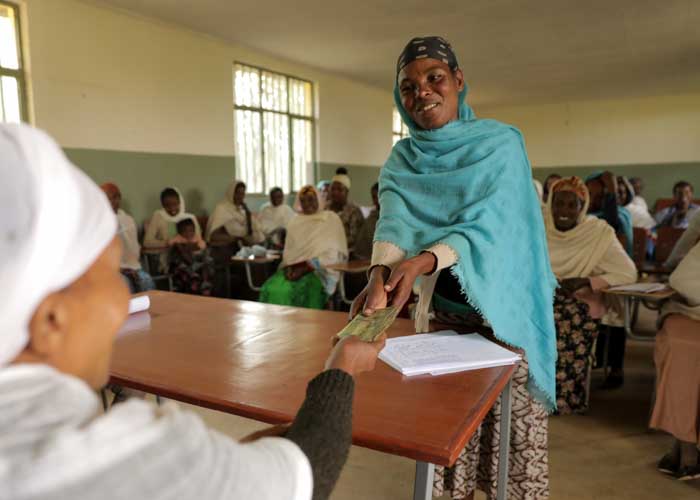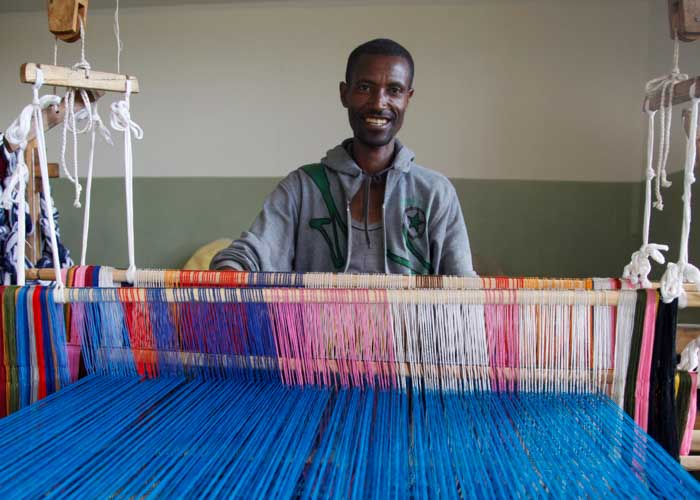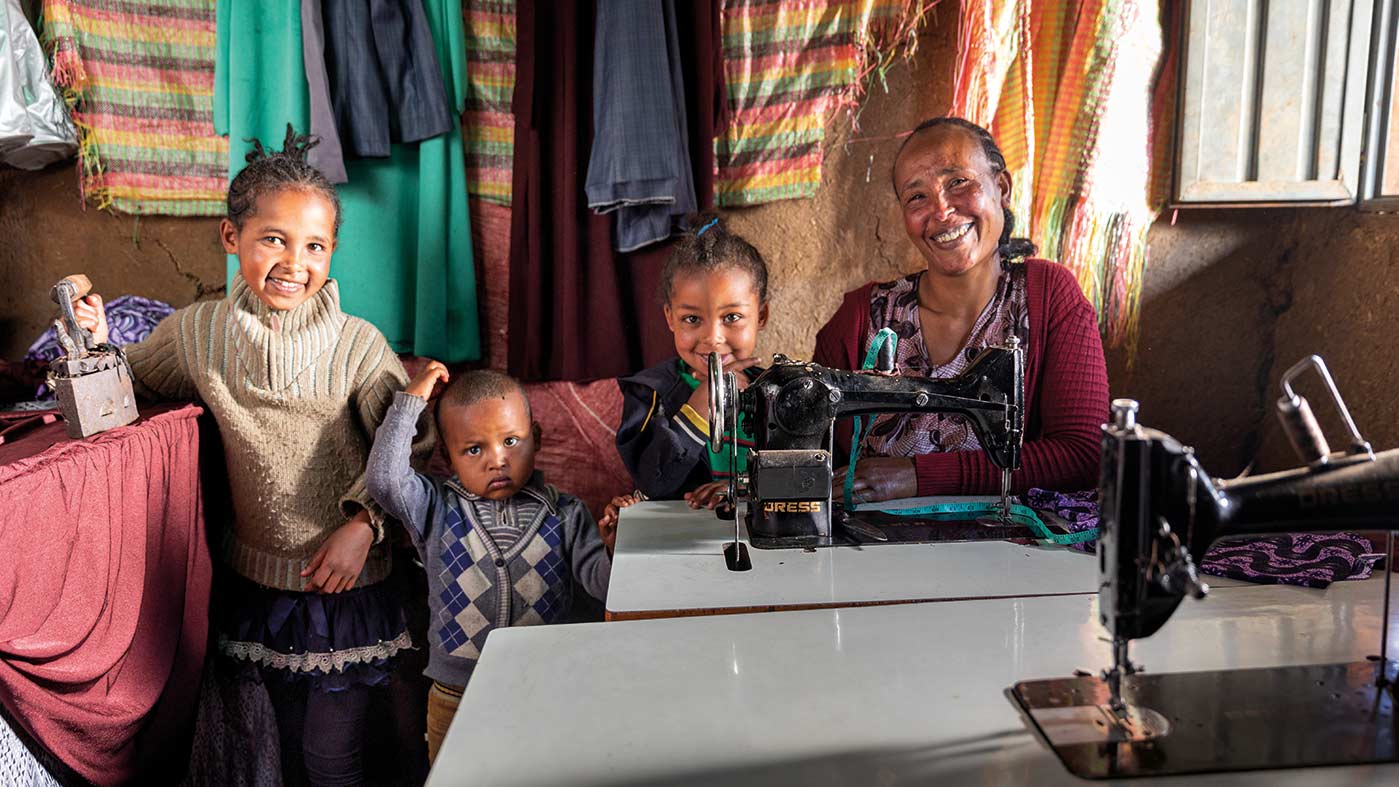
Income
"When people have an income they can depend on, they can contribute actively to the development of their homeland."
In the rural regions of Ethiopia, most people survive through a hand-to-mouth existence living off the land. But it is becoming increasingly difficult for families to obtain a livelihood using the traditional farming methods. We have thus been introducing various measures designed to provide people with alternative forms of income.
Help us to increase the income and thus improve the life of families in Ethiopia!
Help us to increase the income and thus improve the life of families in Ethiopia!
It makes an extraordinary difference to the lives of families when they know they have an income they can depend on! And those living in our project areas will tell you about the extent that this is the case.
A secure income has beneficial effects on nearly all aspects of life. Those with a reliable income can feed their families, give their children an education and take better care of their health.
Currently, some 70% of the population in Ethiopia live off the land. The areas each family cultivate are often very small while soil erosion and climate change represent major problems. Many families can hardly survive on what their fields yield. The situation is further exacerbated by the fact that available land is becoming ever scarcer so that young people have few perspectives in this connection. Women are particularly disadvantaged. There are very few opportunities for them to earn their own income. This means there is an urgent need for young men and women to have alternative means of gaining a livelihood apart from working in the fields.
Currently, some 70% of the population in Ethiopia live off the land. The areas each family cultivate are often very small while soil erosion and climate change represent major problems. Many families can hardly survive on what their fields yield. The situation is further exacerbated by the fact that available land is becoming ever scarcer so that young people have few perspectives in this connection. Women are particularly disadvantaged. There are very few opportunities for them to earn their own income. This means there is an urgent need for young men and women to have alternative means of gaining a livelihood apart from working in the fields.
Self-determination and development
With a dependable income, people have the opportunity to manage their lives themselves and contribute to improvements where they live. Our measures are designed to provide those living in our project areas with the opportunity to establish a means of earning a livelihood and take better care of themselves and their families that does not involve the need to pursue farming.Self-determination and development
With a dependable income, people have the opportunity to manage their lives themselves and contribute to improvements where they live. Our measures are designed to provide those living in our project areas with the opportunity to establish a means of earning a livelihood and take better care of themselves and their families that does not involve the need to pursue farming.What we do
Our activities in our focal area of human development and income are as follows:
Start up support programs and promotion of micro businesses for women and young adults
Training in improved handicraft, such as sewing, weaving and pottery
Provision of technical courses, such as in IT for young people
Support of cooperative businesses (working, for example, in the sectors of apiculture or mushroom cultivation)
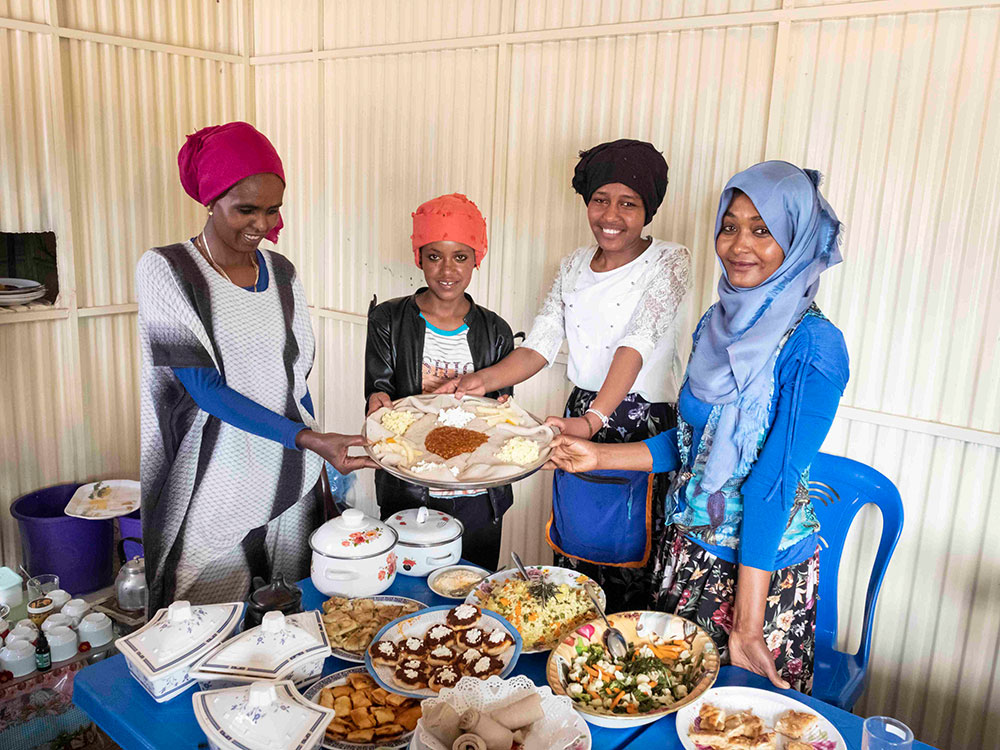

From micro credit to micro business
For almost 30 years, Menschen für Menschen's microcredit program has had an extensive impact on thousands of women in rural Ethiopia. This successful initiative was reorganized at the start of 2024. The focus is on supporting groups in which several individuals join forces with their ideas to set up micro-enterprises. The program includes an extended group of people and, in addition to promoting women, is particularly dedicated to supporting young, unemployed women and men, who were previously unable to participate in the program. There is a lack of jobs in rural regions, and many young people are therefore moving to urban areas. The adaptation of the program will help to counteract the rural migration in the future and strengthen the economy in the regions. Participants are selected based on criteria such as lack of employment and financial means. They come together in groups of five and develop a business idea together - depending on their training and interests. One example would be setting up a car repair shop, a bakery or a restaurant. In each case, the members receive entrepreneurial and, if required, specialist training and the necessary operating or production resources.
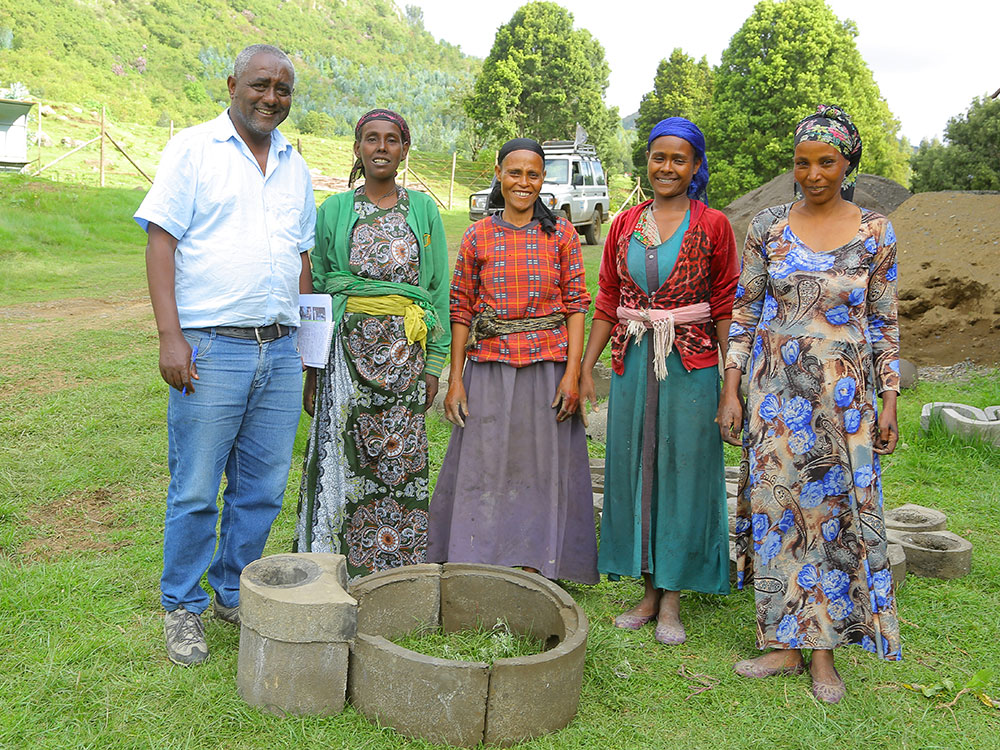

Support for women – development for everyone
The promotion of micro businesses is aimed in particular at destitute women, enabling them to earn their own income. This gives women more independence and self-determination. When the economic situation of women improves, it has a positive effect on the community as a whole. The level of equality between women and men is improved while women find that their voices are better heard. It is often women who are committed to ensuring their children receive education or exhibit more interest in vaccination and family planning programmes. It is in this way that they can contribute to sustainable developments within their regions.
Men also benefit when the economic and social situation of women improves. For many men, having to provide for their families alone is a huge burden. It is a great relief if the woman can contribute to the family income. As part of the support program, the women set up a cooperative to jointly implement a business idea, such as the production of wood-saving stoves. The cooperatives receive training and the necessary equipment or raw materials from Menschen für Menschen. The women gain more self-confidence through their financial independence and their position in society improves. As a result, they also act as role models for their daughters and the next generation.
Men also benefit when the economic and social situation of women improves. For many men, having to provide for their families alone is a huge burden. It is a great relief if the woman can contribute to the family income. As part of the support program, the women set up a cooperative to jointly implement a business idea, such as the production of wood-saving stoves. The cooperatives receive training and the necessary equipment or raw materials from Menschen für Menschen. The women gain more self-confidence through their financial independence and their position in society improves. As a result, they also act as role models for their daughters and the next generation.
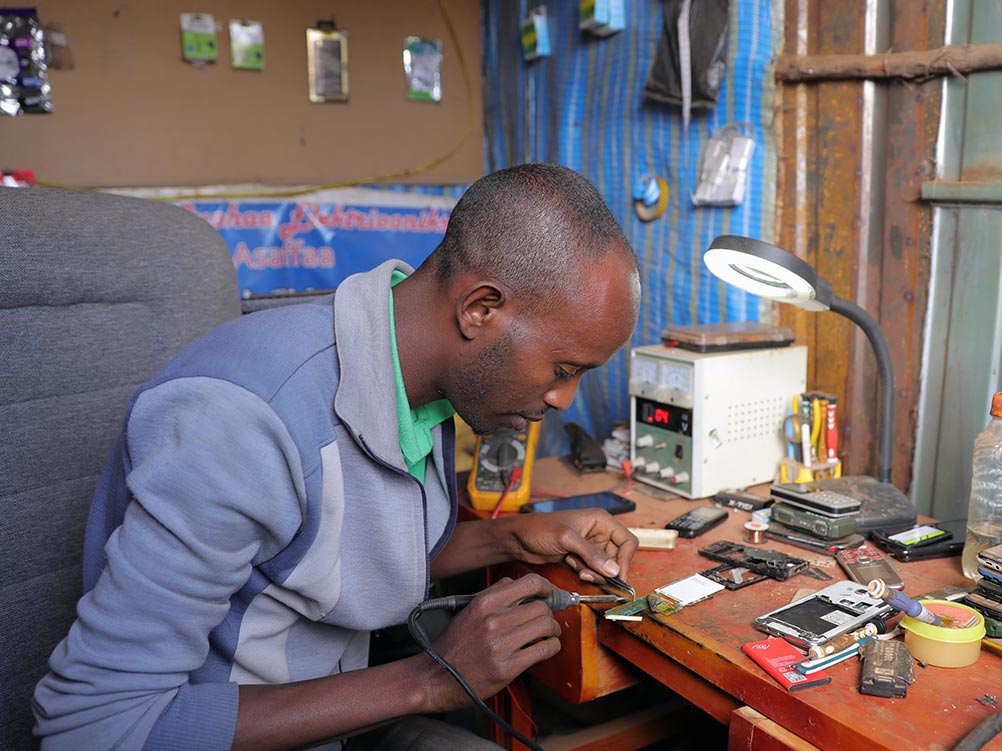

Young people with an outlook
About half the population of Ethiopia is under the age of 20 years. And the greatest wish of these young people is to secure their own livelihood. We help them exploit their potential and find alternative sources of income that are not derived from farming.
In Ethiopia's rural regions we offer courses in hairdressing and technical subjects, such as mobile communications, computer and automotive technology. These young adults, who often have some prior professional experience, are helped to extend their knowledge, learn new skills or start a new business. They not only have the opportunity to suitably support their families, but they also contribute to the economic development of their locality.
And when it comes to those reliant on farming, we also assist young adults to find alternative sources of income. The members of our cooperative apiculture and mushroom cultivation associations learn the business theory and practice and are supplied with the necessary materials and tools. Neighbouring regions have begun to emulate our cooperative concept – thus ensuring such developments spread beyond borders.
In Ethiopia's rural regions we offer courses in hairdressing and technical subjects, such as mobile communications, computer and automotive technology. These young adults, who often have some prior professional experience, are helped to extend their knowledge, learn new skills or start a new business. They not only have the opportunity to suitably support their families, but they also contribute to the economic development of their locality.
And when it comes to those reliant on farming, we also assist young adults to find alternative sources of income. The members of our cooperative apiculture and mushroom cultivation associations learn the business theory and practice and are supplied with the necessary materials and tools. Neighbouring regions have begun to emulate our cooperative concept – thus ensuring such developments spread beyond borders.
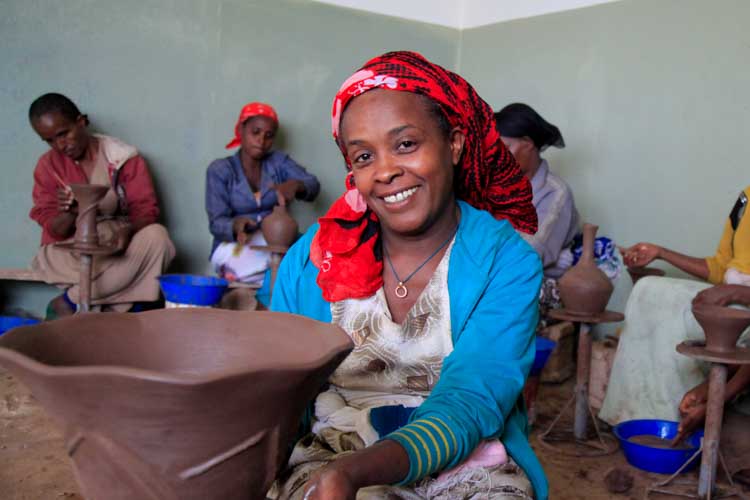

Occupations with a future
Those who do not have access to land can usually only work as low-paid day labourers without long-term prospects. Their families face an uncertain hand-to-mouth existence. To help such landless people, it is essential to teach them artisan trades so that they can earn an income that is not dependent on working in the fields. Those who already have some prior skills can enhance these and learn how to make a living from activities such as weaving and pottery. The learning of new techniques and of how to correctly prepare the materials enables them to create high-quality products that they can sell.
